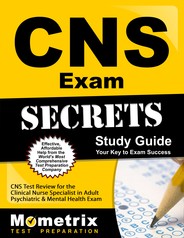Description
A Clinical Nurse Specialist (CNS) is an advanced nursing practitioner who participates in the care of seriously ill adult patients.
Credentialing Organization
American Nurses Credentialing Center. You will be required to take computer-based examination, the fee for which will depend on whether you are a member of the American Nurses Association or the National Association of Clinical Nurse Specialists.
Upon passing the examination, you will be given the following credential: CNS-BC (Clinical Nurse Specialist-Board Certified). You’ll need to renew your certification after five years.
ANCC Study Guide
Explore our free CNS Certification review provided by Mometrix. Check out our premium CNS Certification study guide to take your studying to the next level. If you benefit from these materials, just click the link below! To compliment our CNS Certification book, we also offer extensive CNS Certification flashcards for even more CNS Certification test prep help.
We hope you enjoy our products! Your purchase helps us make more great, free ANCC certification content for test-takers just like yourself.




 Get Your Study Guide
Get Your Study Guide Get Your Flashcards
Get Your Flashcards